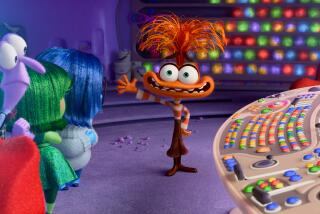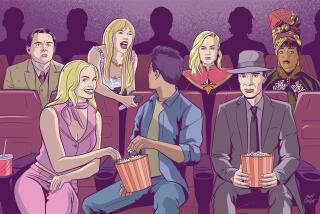Time-traveling to success
- Share via
A dense hybrid of teen angst and science fiction, a metaphysical meditation on the nature of being and time travel aided by the presence of a 6-foot-tall bunny rabbit, “Donnie Darko” hit theaters in the fall of 2001 with a resounding thud of indifference. The disastrous initial release of the debut feature from then 26-year-old writer-director Richard Kelly should have been the beginning of a rapid descent into movie-land oblivion. Then a funny thing happened on the way to being forgotten.
Beginning with a series of feverishly attended midnight screenings around the country, followed by a surprisingly successful theatrical success in Britain and capped off by its release on DVD, “Donnie Darko” has grown into perhaps the preeminent cult film of this decade. The transformation from bomb to breakthrough is now beginning a new phase with the release of an extended director’s cut, which has its Los Angeles premiere Thursday at the American Cinematheque and which opens in theaters July 23. Featuring more than 20 minutes of footage not included in the initial theatrical cut (including shots not even available among the extensive outtakes on the DVD), as well as a new sound mix, additional songs and visual effects, the re-release is unprecedented for a first-time filmmaker.
Kelly, now 29, seems philosophical about the film’s curious fate. “In hindsight, I’m kind of grateful because it’s being seen now as a success entirely on its own merits. Honestly, if it hadn’t failed I wouldn’t be getting this re-release and the opportunity to finish my movie as I’d always wanted to. Everything happens for a reason.”
From its inception, “Donnie” had always been a problem child. Kelly and producer Sean McKittrick struggled for more than a year to get the film financed, eventually raising their modest budget through the involvement of Drew Barrymore as producer and costar. They assembled a cast that appears all the more impressive in hindsight, including as it does such rising talent as Jake Gyllenhaal, Jena Malone and Maggie Gyllenhaal, as well as established actors Patrick Swayze, Noah Wyle and Katharine Ross. Heading into the requisite acquisitions frenzy of the 2001 Sundance Film Festival, “Donnie Darko” was considered a definite buzz item. The tale of a troubled teenager who may be mentally ill or just as possibly may have been transported to a parallel universe, the dark and challenging film did not have the feel-good spark that usually inspires festival bidding wars.
“It was such a weird movie,” says Marc Valen, a programmer with the Landmark Theatres chain who attended the film’s premier Sundance screening. “Everybody afterward, you could sense a feeling of general disappointment. The film is so many different things, it’s very ambitious, and people just didn’t know what to make of it.” A months-long process of failed negotiations and disappointment followed. Kelly trimmed seven minutes in hopes that certain distributors would give the film a second look. He wrote the script for “Southland Tales,” the film he will begin shooting this fall, simply to cheer himself up. Newmarket Films, a relative upstart distributor then riding high on its success with “Memento,” eventually picked up the picture, only to release it in the ill-fated months after Sept. 11. Though disappointed, Kelly was simply happy the film hadn’t been summarily dispatched to cable and video. “After Sundance the film was seen as inaccessible, uncommercial and at best an impressive failure,” he says. “There was such a negative energy around the film at the time, the fact that Newmarket even gave it a release at all, I don’t hold any ill will.”
Bob Berney, president of Newmarket Films and famed for his marketing savvy in selling such films as “Y Tu Mama Tambien,” “Monster” and most recently “The Passion of the Christ,” was at the time working for IFC Films but nevertheless oversaw the initial release of “Donnie” as part of his transition from an earlier stint at Newmarket. Though it earned something less than $600,000 at the time, Berney is reluctant to point fingers for the film’s spectacular disappointment at the box office. “I think it was really just a classic case of tough timing. It opened essentially right after Sept. 11, and I think it really was just the general mood of the country, and people just couldn’t even deal with it.”
Likewise, Kelly prefers not to blame the marketing, as is often the fashion when a film performs poorly. “You can second-guess yourself, but that’s how it happened. Not to beat a dead horse here, but it was initially released on 58 screens in eight cities. Every theater outside L.A. and New York was empty. There was a complete lack of awareness in other cities. The film just kind of disappeared.”
By the end of the year, however, “Donnie Darko” had been booked as a midnight movie at the Two Boots Pioneer Theater, a 100-seat venue attached to a pizza parlor in New York City’s East Village. The film would play there every weekend for more than two years. Landmark’s Valen first booked the picture as a midnight screening in the spring of 2002 because of patron requests passed on through theater managers. “I thought, ‘That’s really interesting,’ because it certainly didn’t do any business initially,” Valen said. “But I like to sometimes give something a try. That’s how cult films are born. So I tried Denver, which is kind of a neutral area, and it did very well. I thought, ‘Wow, I’d like to see how that does somewhere else.’ We started playing it other places, and it just kept growing.”
The enigmatic “Donnie Darko” website, supervised by Kelly, contained additional information not included in the film, most notably pages from a book titled “The Philosophy of Time Travel,” which Kelly had written while editing the picture as a way of explaining it to himself. (Images of those pages mark one of the major additions to the director’s cut.) A strong Web-based following began to emerge, with multiple message boards and chat rooms popping up full of people discussing their own theories on the film’s meaning.
Things approached fever pitch with the release of the DVD in early 2003. Kelly had made certain to cram the disc full of hidden information and arcana because, he says, “I knew the DVD was going to be my day in court, the thing that saved me. Ultimately the DVD was what the film would be judged on, because no one saw it in theaters.”
The disc has gone on to make, according to Berney, “somewhere around $7 million, which is approximate, but that’s really good considering theatrical was around $600,000.” Kelly says he has even more extras up his sleeve for the eventual DVD release of the director’s cut.
“At well over 750,000 copies sold, it far outperformed anything we’ve seen with that level of box office,” said Steve Feldstein, senior vice president of 20th Century Fox Home Entertainment, which distributed the video. “Like many films that didn’t find an audience in theaters, this one certainly did in DVD -- and it continues to sell.”
Having done a small test release in Seattle following the world premiere of the director’s cut at this year’s Seattle International Film Festival, Berney is optimistic about the film’s prospects in theaters the second time around. “I think the main goal is to have fun with the theatrical release, show audiences what Richard has done and see how it goes. In my mind, it’s sort of a success that we’ve done it, and we feel like it’s a completed circle. Business-wise, I feel like there’s a real shot for this to work in terms of the money and time we’ve invested in this new version. I think it will be a great payoff.
“The whole thing with ‘Donnie,’ it just fits. I almost feel like we at Newmarket are going backwards to go forwards, like the film somehow. It is unusual, but nothing about the re-release, or anything about ‘Donnie,’ is usual or makes any real sense. I look at it like this was the path. For whatever reason, it took a certain path to success and it took a while, but it’s made it.”
Kelly is currently busy prepping “Southland Tales,” which he reluctantly describes as 30% a musical, while also seeing a number of scripts he has written for other directors, including Tony Scott and Jonathan Mostow, move toward production. For the moment he is happy as well to revisit the strange saga, both on screen and off, that is “Donnie Darko.”
“I look forward to the day I can talk about something else,” he says, “but I feel obliged to talk about this as long as people want to hear it. I get tired of hearing myself talk about this movie, but I’d never want to appear ungrateful that people are curious and interested. So I’m happy to do so as long as I’m not overstaying my welcome. I just don’t want people to think I’m a one-hit wonder.”
More to Read
Only good movies
Get the Indie Focus newsletter, Mark Olsen's weekly guide to the world of cinema.
You may occasionally receive promotional content from the Los Angeles Times.











